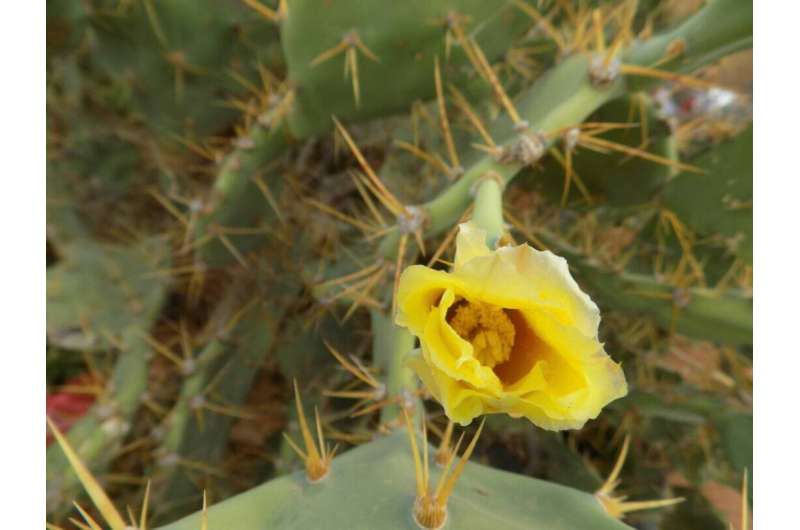Biocontrol most cost-effective in fight against common pest pear Opuntia stricta

The cochineal Dactylopius opuntiae 'stricta' biotype is more effective as a sustainable biocontrol in the fight against the invasive common pest pear Opuntia stricta in Laikipia County, Kenya, compared to physical and/or chemical control—CABI scientists can now reveal.
Dr. Arne Witt, based at CABI's center in Nairobi, led on research published in BioControl which shows that the D. opuntiae 'stricta' biotype—that was released in 2014—has contributed to a 'significant reduction' in the number of cladodes, flowers and fruit of plants with cochineal.
Following a preliminary once-off survey, Dr. Witt and collaborators Winnie Nunda, Fernadis Makale and Kathryn Reynolds, demonstrated that fruits that were produced on plants with the cochineal were also smaller and had fewer seeds.
Dr. Witt said, "Although still preliminary, an analysis of the costs of implementing the D. opuntiae 'stricta' biotype indicate that it is the most cost-effective management intervention compared to physical and/or chemical control.
"Furthermore, while the impact of the cochineal is still fairly localized, we are confident that it will establish in much of the invaded range and reduce the impacts of the invasive cactus, consequently improving rangeland condition and livelihoods."
Since its introduction to Kenya in 1949, O. stricta is considered to be the most widespread and problematic cactus species—being most abundant in Laikipia County and Tsavo East National Park and adjacent rangelands where it forms dense stands and prevents access to homes, water resources and pasture.
"It is still too early to confirm if the agent D. opuntiae 'stricta' biotype will contribute to the complete control of O. stricta in Laikipia," Dr. Witt added. "However, early indications do warrant the re-distribution of the agent to Tsavo East NP and the Serengeti-Mara ecosystem, which has some significant invasions."
Dr. Witt also revealed that a biotype of O. stricta for the control of Opuntia engelmannii has also been sourced in the U.S. and will 'hopefully be released' in Laikipia when approval has been granted from the regulatory authorities.
More information: Arne B. R. Witt et al, A preliminary analysis of the costs and benefits of the biological control agent Dactylopius opuntiae on Opuntia stricta in Laikipia County, Kenya, BioControl (2020). DOI: 10.1007/s10526-020-10018-x
Provided by CABI





















